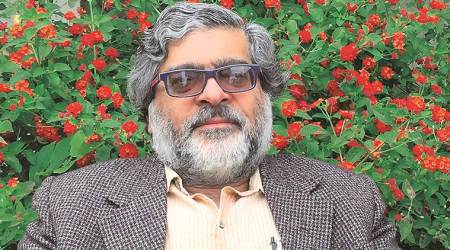 The Karwan began on September 4 and, till now, has covered Assam, Jharkhand and Karnataka. After Delhi, it moves to Shamli, Mewat, Rajasthan and Gujarat — ending at Porbandar on October 2.
The Karwan began on September 4 and, till now, has covered Assam, Jharkhand and Karnataka. After Delhi, it moves to Shamli, Mewat, Rajasthan and Gujarat — ending at Porbandar on October 2.
Among the 35 people travelling with activist Harsh Mander’s Karwan-e-Mohabbat are IIM Trichy (Tamil Nadu) professor Prabhir Vishnu Poruthiyil, social worker Asghar Sharif from Chhattisgarh and professor Hafiz Ahmed from Guwahati. Absolute strangers, they began travelling in the Karwan bus for the same reason — to show solidarity with victims of mob lynching across the country. On Monday, they reached Delhi’s Gandhi Darshan, and sang ‘Raghupati raghavraja ram’, before heading to Tilak Vihar.
“I teach Business Ethics at IIM…the lack of concern for larger social issues in business schools is striking. Business leaders, too, haven’t said a word against what’s happening. I hope to use this experience in my class when I return,” said Poruthiyil. The Karwan began on September 4 and, till now, has covered Assam, Jharkhand and Karnataka. After Delhi, it moves to Shamli, Mewat, Rajasthan and Gujarat — ending at Porbandar on October 2.
At Tilak Vihar, over a hundred residents of the post-1984 riots rehabilitation colony welcomed the group. Handwritten postcards of those who survived the 1984 anti-Sikh riot hung from sarees in one corner of the shamiana put up in the colony park. While Jasbir Singh wrote about losing his father, another man, Dilip Singh, recounted the horror of watching his uncle burn to death.
The stage was set alight with a dance performance by a group of young girls, followed by Sufi singer Dhruv Sangari, and a moving performance by Sonam Kalra, who evoked the likes of Amir Khusro and Faiz Ahmed Faiz.
Among the audience was 60-year-old Makhni Kaur, who lost eight members of her family in the riots. “Hum guzre hain iss gam se…yeh dobara na ho isliye aaj aaye hai Karwan ko dekhne (We have been through this sorrow… so that it doesn’t happen again, we have come here to be part of the Karwan),” she said.
Talking about the need for this Karwan, Mander said, “There is a sense of fear across the country, there is a need for a voice of solidarity. Riots are limited by geography but mob lynching isn’t.” Through the journey, apart from the tales of horrors recounted by families of victims of cow-related lynchings, Mander has faced opposition too.
“Mostly from the majority community… the silence at such times means consent. But I am determined to create a support system, comprising lawyers, to continue the Karwan even when the journey is over,” he said.

